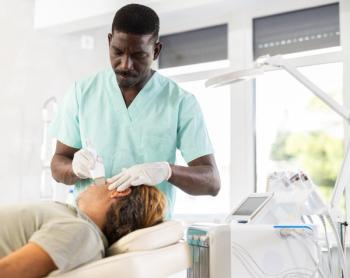
- Dermatology Times, January 2021 (Vol. 42, No. 1)
- Volume 42
- Issue 1
Pathogens, Microbiota May Impact Rosacea
One expert says the action of demodex folliculorum and the composition of the symbiotic microbiota in the skin of patients with rosacea may provide valuable insights into the pathogenesis and pathophysiology of this widespread skin disease.
New data on the action of demodex folliculorum and the composition of the symbiotic microbiota in the skin of patients with rosacea may provide valuable insights into the pathogenesis and pathophysiology of this widespread skin disease, said Elena Araviiskaia, MD, PhD, professor, Department of Dermatology, First Pavlov Medical State University of Petersburg, St. Petersburg, Russia, in her presentation1 at the European Academy of Dermatology and Venereology 2020 Virtual Congress October 28–November 1.
Various factors have been implicated in the development of rosacea including genetics, the innate immune system, vascular hypersensitivity, ultraviolet radiation, skin barrier dysfunctions as well as the patient’s skin and gastrointestinal (GI) microbiome status.
The composition of the skin’s microbiome is crucial for normal skin immune functions. The imbalance of the skin’s microbiota and/or perturbation of its microbial populations have long been thought to play a key role in rosacea, she adds. Continued research has shed some light on the role of the microbiome in rosacea, in particular the impact of demodex folliculorum. In patients with rosacea, some potentially pathogenic bacteria include Bacillus oleronius, Bartonella quintana, and Chlamydia pneumonia, which are sometimes found within the demodex mite itself, and Helicobacter pylori (H. pylori), she adds.
Recent studies also implicate imbalances in the gastrointestinal flora in the development of rosacea symptoms. It has become clearer that rosacea is associated with systemic inflammation and with a number of GI comorbidities including celiac disease, ulcerative colitis, Crohn’s disease, irritable bowel syndrome, gastroesophageal reflux disease, and H. pylori colonization, according to Araviiskaia. Other comorbidities linking rosacea to systemic inflammation include cardiovascular comorbidities, myocardial infarction, diabetes mellitus, and hyperlipidemia.
“Of the comorbidities seen in patients with rosacea, most are associated with GI diseases,” says Araviiskaia. “Whether these are due to the breakages of the barrier of the gut or indirect via innate immunity still needs to be clarified." She recommends that future research and studies in rosacea focus on symbiotic microbiota and the potentially pathogenic bacteria, as well as the still incompletely known impact of Staphylococcus epidermidis in the development of the disease.
“Continued research will offer new medications and open the door for novel therapeutics including probiotics and dermocosmetics, both of which have shown good efficacy in modulating the microbiome and improving the symptoms of rosacea,” says Araviiskaia.
Disclosures:
Araviiskaia reports no relevant disclosures.
References:
1 Araviiskaia E. Role of the microbiome in rosacea. Oral presentation at: European Academy of Dermatology and Venereology 2020 Virtual Annual Congress, October 28–Nov. 1, 2020
Articles in this issue
almost 5 years ago
New AAD-NPF Psoriasis Guidelines Mark Changesabout 5 years ago
Combination Rosacea Therapy Improves Outcomeabout 5 years ago
IL Inhibitors and TYK2 Blocker Near Approvalabout 5 years ago
Medicare Spending on Skin Cancer, AK Varies Widelyabout 5 years ago
Positive Study Outcomes Pave the Way for Topical PRPabout 5 years ago
Tips for Navigating Practice Challenges During COVID-19about 5 years ago
What Role Will Telehealth Play After COVID-19about 5 years ago
COVID-19-Related Telehealth Broadens Patient Populationabout 5 years ago
Study Examines Finasteride Risks for Younger MalesNewsletter
Like what you’re reading? Subscribe to Dermatology Times for weekly updates on therapies, innovations, and real-world practice tips.











